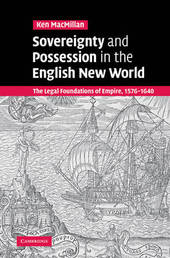
|
Sovereignty and Possession in the English New World: The Legal Foundations of Empire, 1576-1640
Paperback / softback
Main Details
| Title |
Sovereignty and Possession in the English New World: The Legal Foundations of Empire, 1576-1640
|
| Authors and Contributors |
By (author) Ken MacMillan
|
| Physical Properties |
| Format:Paperback / softback | | Pages:252 | | Dimensions(mm): Height 229,Width 152 |
|
| Category/Genre | British and Irish History
Colonialism and imperialism
National liberation, independence and post-colonialism |
|---|
| ISBN/Barcode |
9780521109796
|
| Classifications | Dewey:942.055 |
|---|
| Audience | | Professional & Vocational | |
|---|
| Illustrations |
11 Halftones, unspecified
|
|
Publishing Details |
| Publisher |
Cambridge University Press
|
| Imprint |
Cambridge University Press
|
| Publication Date |
30 April 2009 |
| Publication Country |
United Kingdom
|
Description
How did contemporary English and European notions of sovereignty, empire, law and state formation impact upon English methods of settlement and governance in the Americas? Using documents such as travel narratives, promotional literature, colonial charters, maps, diplomatic correspondence and state papers, Ken MacMillan offers a major new study of legal imperialism under Queen Elizabeth and the early Stuarts. He argues that the imperial centre had a legal and historical right and responsibility to supervise its colonial peripheries. By drawing on legal resources associated with Roman law and the law of nations, the crown and its agents ensured that English New World claims would gain recognition in the broader European community, thereby establishing legal foundations that would have an enduring impact on the British Empire. The book will appeal to scholars in imperial studies, English and American legal and constitutional history, foreign affairs and the history of international law.
Author Biography
Ken MacMillan is Assistant Professor of History at the University of Calgary. He is the editor of John Dee: The Limits of the British Empire (2004).
Reviews"MacMillan's exploration of the earliest origins of the British transaltlantic imperial constitution is a valuable study that enables us to see the full range of jurisprudence that ultimately became the foundation of British-American constitutionalism in the eighteenth century." -Erin Rahne Kidwell, Georgetown University Law School "[...]this exhaustively researched and gracefully written monograph is important historiographically and substantively, and deserves a wide and critical readership." -Herbert A. Johnson, The Journal of American History "Ken MacMillan[...]offers several interesting arguments about the ways sovereignty was asserted by Elizabeth I, James I, Charles I and their subordinates." -James Muir, H-Law "The result is a tightly focused and clearly argued exploration of the early English legal justifications for why England, rather than Spain, France, or anyone else, had the right to claim the parts of North America that would become English colonies. -Stuart Banner, Law and History Review "MacMillan's considerable achievement[...]is to explain the expressive logic[...]of English soverign possession in the New World." -Christopher Tomlins, Institute of Historical Research "MacMillan's book is well-written and convincing[...]impressive debut book." Daniel Woolf, The International History Review "There is no question that MacMillan has written a book of considerable importance, one from which British and American historians alike will benefit." -Eliga H. Gould, University of New Hampshire, American Historical Review "Ken MacMillan has effectively pulled aside Strabo's cloack, and given us a vastly rich and promising route into the British Atlantic World." -Charles W.A. Prior, University of Hull, Canadian Journal of History "...excellent book....ambitious comparative analysis....clear and compelling manner in which MacMillan links the Crown's methods of asserting possession and sovereignty in America to the broader issue of the legal status of the colonies vis-'a-vis England....For acquainting us with this all-important imperial actor and the Roman law that it wielded with such confidence, we are indebted to MacMillan and his fine book." --Alexander Haskell, University of California, Riverside, William and Mary Quarterly
|